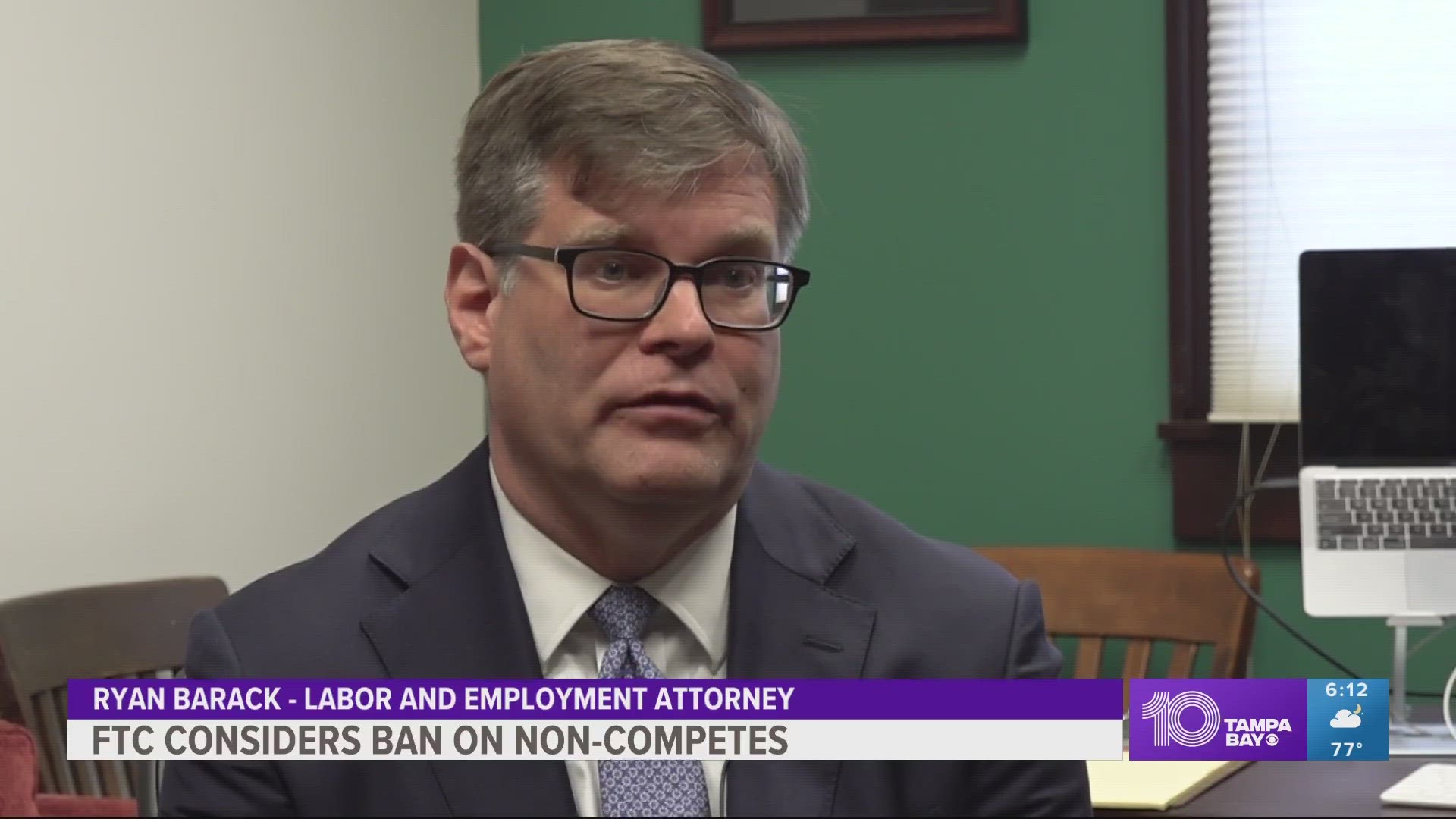CLEARWATER, Fla. — According to the Federal Trade Commission, one in five Americans are impacted by non-compete clauses — that's 30 million people.
The FTC is considering a proposed ban on non-competes altogether. The ban would make it illegal to enter into a non-compete or to maintain an existing one.
The FTC estimates that banning non-competes may increase workers' earnings by $300 billion, double the number of companies in the same industry founded by a former worker and save consumers up to $148 billion on health costs each year.
Non-competes impact works across industries and job levels.
"It seems well overdue," Robert Brady said when speaking of the proposed ban.
Brady is a psychiatric nurse practitioner. Right now, he's fighting to keep his business open.
"They're coming after for a substantial amount of money and to actually shut my practice down, which would be devastating," Brady said.
Brady previously worked at Harmony United Healthcare, with an office located in Palm Harbor. Brady signed an employment agreement, which is now part of a lawsuit against him.
In his employment agreement is a non-compete clause.
"Employee agrees that for a period of two (2) years immediately following termination (voluntary or otherwise) of Employee's service with the Company, he will not undertake any service or activity competitive with the company's business within twenty (20) miles "as the crow flies" from any of the company's offices, or places where Employee provided services for Company," the clause reads.
Harmony United is suing Brady for violating that clause. He opened his own psychiatric clinic one day after he left his previous job.
"I felt a strong sense of obligation to continue to try to meet the needs of the community and want to continue to do so," Brady said. "So I started my own practice in that community."
Harmony United has locations across the state. Brady said the company closed its Palm Harbor location months before he opened his new practice, Journey Psychiatry, and Behavioral Health.
But that didn't matter.
"Florida law is awful for employees on non-competes, it's really the worst in the country," Ryan Barack said.
Barack is a board-certified labor and employment attorney, representing Brady. He's dealt with plenty of lawsuits surrounding non-competes and is also advocating for the FTC to outlaw them entirely.
"You have to understand that you're looking at expensive litigation, we have success and getting people out of non-competes," Barack said. "But it's not easy and it's not cheap."
Barack said the justifications made for having non-competes are outdated and unneeded.
"Many employers say that they are to protect trade secrets or business relationships," Barack said. "Trade secrets would still be protectable.The question is, how are we protecting them? And are we going overboard with protecting them? That's really what the FTC is trying to address."
Along with those in healthcare, non-competes impact hair stylists, business executives, journalists, warehouse workers and more.
"Eliminating that non-compete can have a huge impact on the individual wage earner, their wages can go up dramatically because they can go across the street and get that better job and not worry about being sued," Barack said.
Barack recently submitted a letter to the FTC on behalf of the Florida chapter of the National Employment Lawyers Association.
"I submitted a comment to the FTC informing the FTC of how awful Florida's non-compete law is, and telling the FTC that we believe that these changes are overdue, and will make a huge impact on employees and really help this whole country."
If you're in the majority of people not directly impacted by a non-compete, it's still a matter that impacts you and your bottom dollar.
"It's a member of their family who can't start that new business," Barack said. "It impacts them because they're paying more, because there isn't that competing competition that we would want.
"It costs almost $150 billion in additional healthcare costs every year, because of non-compete agreements. So you're not able to see the doctor you want and you're paying more when you can see a doctor, where we have this health care crisis in our country, we should be doing everything we can to allow physicians and health care providers to provide care, but we're not. We're limiting their ability to provide care and that's awful."
For Brady, he said he's fighting the lawsuit for the same reason he opened his practice — to be able to help his community by providing mental health resources.
"It stirs up so many emotions," Brady said. "I'm one of many who want to be innovators in their field, who feel called and compelled to serve a particular community and are being told by an employer, 'you can't do that.' This is in a time where we have a mental health crisis. It's frustrating. It's very frustrating."
The FTC wants to hear your opinion on this. The public comment period is open through Wednesday, April 19. To submit a comment, click here.
If the non-compete ban moves forward, there is a mandatory 180-day notice period before it can be made effective.
Malique Rankin is a general assignment reporter with 10 Tampa Bay. You can email her story ideas at mrankin@10tampabay.com and follow her Facebook, Twitter, and Instagram pages.

